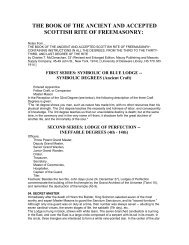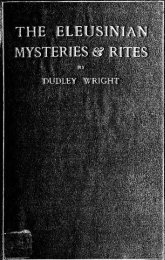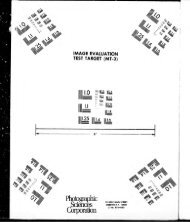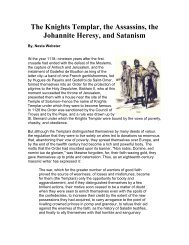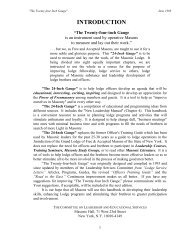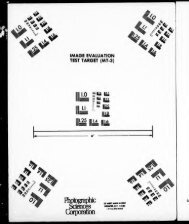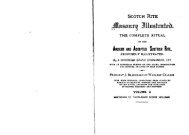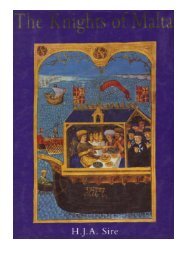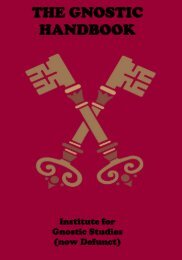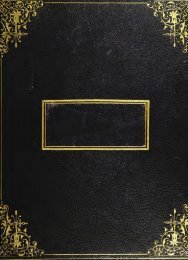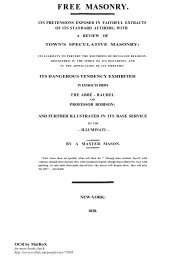The History of Initiation - The Masonic Trowel
The History of Initiation - The Masonic Trowel
The History of Initiation - The Masonic Trowel
You also want an ePaper? Increase the reach of your titles
YUMPU automatically turns print PDFs into web optimized ePapers that Google loves.
DOCTRINES OP THE DRUIDS. 161<br />
was perpetuated in these rites ; perverted, indeed, and<br />
localized, like that <strong>of</strong> most other nations ; and the circumstances<br />
attending this tradition appear to have pervaded<br />
their most solemn rites and ceremonies. <strong>The</strong><br />
doctrine <strong>of</strong> transmigration formed a leading feature in the<br />
Druidical system, 56 and was extended to the belief that<br />
the departed soul <strong>of</strong> a virtuous individual possessed the<br />
secret power <strong>of</strong> infusing itself at pleasure into any substance,<br />
whether animate or inanimate. 57<br />
<strong>The</strong> Druids cultivated, and taught to their disciples,<br />
many <strong>of</strong> the liberal sciences, 58 and particularly astronomy,<br />
in which they attained a considerable pr<strong>of</strong>iciency, dis-<br />
played in the construction <strong>of</strong> their religious edifices.59<br />
Banawg, or the oxen <strong>of</strong> Hu Gadarn, was emblematical <strong>of</strong> the sun drying<br />
up the waters from the face <strong>of</strong> the earth; (Ibid, viii., 13,) for Hu was<br />
the helio-arkite deity; and the assurance <strong>of</strong> preservation, commemorative<br />
<strong>of</strong> Noah's rainbow, (Ibid. ix. 13,) was undoubtedly symbolized<br />
in the Chair <strong>of</strong> Ceridwen.<br />
5(5<br />
c. 14.<br />
Cesar, de bel. Gal. 1. vi.,<br />
07 Hence a deceased friend could give force to a warrior's sword ;<br />
could occupy his shield, or avert a flying javelin, armed with destruction.<br />
This is amply illustrated in the poem <strong>of</strong> Cynddelw, addressed<br />
to Owen Cyveiliawy, Prince <strong>of</strong> Powis. (Dav. Dru., p. 15.) "In the<br />
form <strong>of</strong> a vibrating shield before the rising tumult, borne al<strong>of</strong>t on the<br />
shoulder <strong>of</strong> the leader in the form <strong>of</strong> a lion before the chief with the<br />
mighty wings in the form <strong>of</strong> a terrible spear with a glittering blade<br />
in the form <strong>of</strong> a bright sword spreading fame in the conflict, and over-<br />
whelming the levelled ranks in the form <strong>of</strong> a dragon (banner) before<br />
the sovereign <strong>of</strong> Britain, and in the form <strong>of</strong> a daring wolf, has Owen<br />
appeared."<br />
58 Alcuin. an Anglo-Saxon writer, says, that in these early times a<br />
liberal education .comprised grammar, rhetoric, arithmetic, geometry,<br />
music, and astrology. (Ale. Gram, apud Canis., torn, ii., par. i.. p. 508.)<br />
Aldhelm extended it to the seven liberal sciences <strong>of</strong> Freemasonry.<br />
(Aid. de laud, vir., p. 331.)<br />
It must be confessed, however, that at the period <strong>of</strong> the Roman invasion<br />
under Cesar, the people were still extremely rude in their diet<br />
and mode <strong>of</strong> life. 1. (Strabo, 4, Diod. 1.<br />
Sic., 4.) Some^went entirely<br />
naked; Xiphil., 1. 21.) others were clothed in the skins <strong>of</strong> beasts;<br />
(Cesar, 1. 5, c. 14.) and the state in which they were found, induced<br />
the Romans to style them barbarians. 1. (Herodian.. 3, Pomp. Mela.,<br />
1. 3. c. 6.)<br />
59 <strong>The</strong> time <strong>of</strong> celebrating public worship sprang from an application<br />
<strong>of</strong> this science. Thus their ordinary times <strong>of</strong> devotion were regulated<br />
and the more solemn quarterly assem-<br />
by the phases <strong>of</strong> the moon ;<br />
blages took place when the sun arrived at the equinoctial and solstitial<br />
points ; (Stukeley, Abury, p. 68,) which at the era <strong>of</strong> their establishment,<br />
about 4000 years ago, corresponded with our 1st May. which<br />
was their grand annual festival, the 19th August, 1st November, and<br />
12



